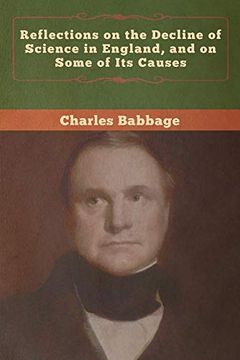Synopsis "Reflections on the Decline of Science in England, and on Some of its Causes"
Charles Babbage, (born December 26, 1791, London, England--died October 18, 1871, London), English mathematician and inventor who is credited with having conceived the first automatic digital computer.In 1812 Babbage helped found the Analytical Society, whose object was to introduce developments from the European continent into English mathematics. In 1816 he was elected a fellow of the Royal Society of London. He was instrumental in founding the Royal Astronomical (1820) and Statistical (1834) societies.The idea of mechanically calculating mathematical tables first came to Babbage in 1812 or 1813. Later he made a small calculator that could perform certain mathematical computations to eight decimals. Then in 1823 he obtained government support for the design of a projected machine, the Difference Engine, with a 20-decimal capacity. Its construction required the development of mechanical engineering techniques, to which Babbage of necessity devoted himself. In the meantime (1828-39), he served as Lucasian Professor of Mathematics at the University of Cambridge.During the mid-1830s Babbage developed plans for the Analytical Engine, the forerunner of the modern digital computer. In that device he envisioned the capability of performing any arithmetical operation on the basis of instructions from punched cards, a memory unit in which to store numbers, sequential control, and most of the other basic elements of the present-day computer. In 1843 Babbage's friend mathematician Ada Lovelace translated a French paper about the Analytical Engine and, in her own annotations, published how it could perform a sequence of calculations, the first computer program. The Analytical Engine, however, was never completed. Babbage's design was forgotten until his unpublished notebooks were discovered in 1937. In 1991 British scientists built Difference Engine No. 2--accurate to 31 digits--to Babbage's specifications, and in 2000 the printer for the Difference Engine was also built.Babbage made notable contributions in other areas as well. He assisted in establishing the modern postal system in England and compiled the first reliable actuarial tables. He also invented a type of speedometer and the locomotive cowcatcher. (britannica.com)

